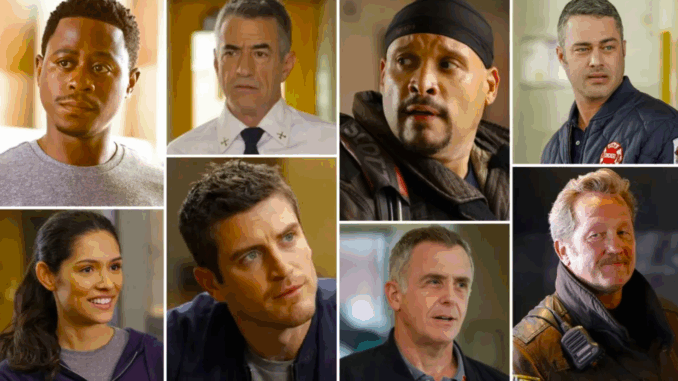
Chicago Fire has never been afraid of change. Over 13 seasons, the long-running NBC drama has built a reputation for reinventing itself—season after season, loss after loss—without losing its identity. With the upcoming exits of Daniel Kyri (Darren Ritter) and Jake Lockett (Sam Carver) confirmed for Season 14, many fans are wondering: can the show survive another shake-up?
If history is any indication, the answer is yes. And it may even come back stronger.
A Legacy of Loss—and Resilience

From the very beginning, Chicago Fire has blended intense action with emotional storytelling. But it’s also become known for the unpredictability of its cast departures. Some exits have been scripted deaths. Others were behind-the-scenes decisions, personal choices, or scheduling conflicts. All of them left a mark.
The most unforgettable was probably the death of Otis (Yuriy Sardarov) in the Season 8 premiere. It wasn’t just a shock—it was a heartbreak that rippled through the firehouse and the fandom alike. Yet the show used that grief to build character arcs that felt raw and real, giving weight to loss in a way few procedurals attempt.
Other departures, like those of Monica Raymund (Gabby Dawson) and Jesse Spencer (Matt Casey), felt like losing pillars of the show. And yet Chicago Fire pushed on, introducing new characters like Stella Kidd, Blake Gallo, and Violet Mikami—each bringing their own energy and earning their place at Firehouse 51.
The Secret to Chicago Fire’s Endurance
What makes Chicago Fire capable of surviving these emotional hits? According to longtime viewers, it comes down to two things: storytelling continuity and emotional honesty.
The show doesn’t pretend characters didn’t matter. When they leave, their absence is felt. Relationships are tested. Adjustments take time. This emotional realism creates a sense of authenticity that viewers respond to—even when they’re upset about the departure itself.
Another factor is the ensemble nature of the show. While fans may latch on to certain individuals, Chicago Fire has always emphasized the collective: a brotherhood and sisterhood bound by duty. This makes it easier for new faces to eventually feel like family.
What Ritter and Carver’s Exit Means
Unlike some past departures, the loss of Ritter and Carver comes not from character resolution, but from behind-the-scenes budget decisions. That adds an extra layer of frustration for fans, who weren’t emotionally prepared for these characters to be written off.
Still, if the show sticks to its pattern, Season 14 will not ignore their impact. Whether through farewell moments, passing references, or arcs that explore how their absence affects others, Chicago Fire knows how to write around change.
Ritter’s legacy—his compassion, mentorship, and quiet strength—will likely echo through characters like Gallo and Violet. Carver’s struggle to prove himself, to grow beyond his past, may influence how new characters are introduced or how Kidd continues to lead.
Casting the Future
If Chicago Fire follows its past formula, expect new hires to shake things up without immediately replacing what’s been lost. For example, when Casey left, the show didn’t force a direct “replacement”—instead, it leaned into Severide and Kidd’s growing leadership roles and gradually introduced side characters who earned trust.
Season 14 could do the same: take its time introducing new members, explore chemistry slowly, and avoid the mistake of trying to recreate Ritter or Carver with copy-paste archetypes.
What fans want isn’t repetition. It’s evolution—with heart.
A Show That Grows Through Grief
It’s painful to say goodbye to characters that feel like family. But Chicago Fire has always been about facing hard truths—on the job, in relationships, and in life. That honesty is what has carried it through years of change.
If the writers honor the exits of Ritter and Carver with the emotional gravity they deserve—and if the show continues to put relationships first—Chicago Fire can not only survive Season 14.
It can thrive.